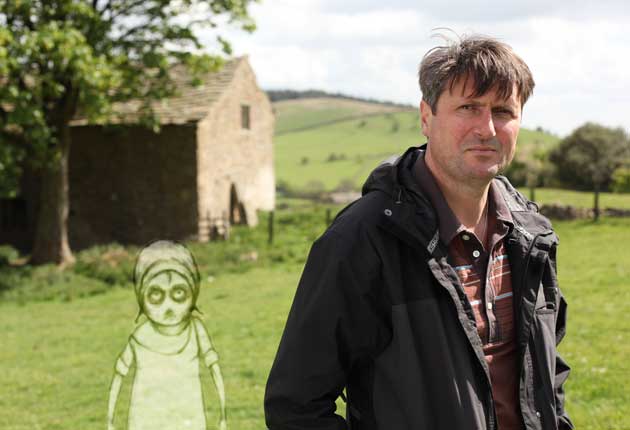Pendle Witch Child, BBC4<br/>Who Do You Think You Are? BBC1<br/>Celebrity Big Brother, Channel 5
Yorkshire poet Simon Armitage was mesmerising as he told the tale of a 17th-century witch trial

Your support helps us to tell the story
From reproductive rights to climate change to Big Tech, The Independent is on the ground when the story is developing. Whether it's investigating the financials of Elon Musk's pro-Trump PAC or producing our latest documentary, 'The A Word', which shines a light on the American women fighting for reproductive rights, we know how important it is to parse out the facts from the messaging.
At such a critical moment in US history, we need reporters on the ground. Your donation allows us to keep sending journalists to speak to both sides of the story.
The Independent is trusted by Americans across the entire political spectrum. And unlike many other quality news outlets, we choose not to lock Americans out of our reporting and analysis with paywalls. We believe quality journalism should be available to everyone, paid for by those who can afford it.
Your support makes all the difference.Four centuries before wizardry and spells became a global franchise thanks to one H Potter, witch-finding was all the rage.
The most infamous trial for witchcraft was the two-day spectacular at Lancaster Castle on 18 and 19 August 1612, when Jennet Device, aged nine, gave evidence against her mother, brother, sister, and seven other family members, all of whom were hanged. Why this ghastly child was allowed to do this, and the consequences of her precocious testimony, were the subjects of a riveting BBC4 documentary.
The Yorkshire poet Simon Armitage, his face set in an expression of fathomless disgust, strode about Pendle Hill ("It's almost beyond the back of beyond") in north-east Lancashire, telling the grim story: the family of beggars, their home of Malkin Tower (17th century-speak for "Shit House"), the locals' weird readiness to believe any tall story about talking animals, the pitilessness of the law, and the oddness of the participants' names (Old Chattox? Granny Demdike?)
The early reign of James I was "a nervy, apprehensive time" in which fear of evil meant fear of Catholics (especially after Guy Fawkes) and other dissenters, subversives, idolators and heathens; everybody suspected their neighbours of being out to get them, whether by gunpowder or curses. The king had written a book, Daemonologie, giving his subjects carte blanche to hunt down witches. When illegitmate Jennet grassed up her relatives in revenge for God-knows-what abuse she'd endured, she found willing listeners.
To flesh out the story, the producers co-opted several Stuart historians who elected to represent key figures from the trial, especially Jennet and her mother, in animated form. As Armitage pored over a 1612 tome, a long grey wailing cartoon ghost of the hapless mother flew out of it; when Jennet's awful testimony was recited, the camera focussed on a cartoon child's cold, staring eyes. It was unsettling at first, then silly, then annoying. It wasn't enough to psoil a fine documentary, but it put a slightly uncomfortable spell on it.
No witchcraft lurked in the family past of J K Rowling, the subject of this week's Who Do You Think You Are?, but a fascinating story emerged. JKR wanted to discover the fate of her great-grandfather Louis Volant, who was awarded the Legion d'Honneur, currently held by her aunt. Rowling travelled into the past, found that Louis had been a wine waiter at the Savoy, that his marriage had broken up and he'd returned to France in 1911. Checking out his military career at the French National Archives ("This is incredible: it's the Hogwarts library!") she found that the Louis Volant who won the Legion d'Honneur didn't have the same birthdate as her ancestor. It transpired her Louis had fought in the First World War and been awarded the Croix de Guerre for last-ditch bravery. When a French soldier offered her a medal in honour of her heroic ancestor, Ms Rowling wept, brandished the family badge and asked: "What is this? I mean, I have a Legion d'Honneur myself, and it looks nothing like this ..."
Celebrity Big Brother returned with new graphics, a new host, Brian Dowling, in a too-tight jacket, and 12 deranged solipsists struggling to converse. Their ideas of what constituted attractive self-presentation were a little wayward. "I'm cackin' myself 'ere," said Kerry Katona. "If this was scratch'n'sniff TV, you could smell me." Thank you, darling. "A lot of people're gointa struggle t'understand me," promised a bewildered Irish bare-knuckle-fighting tinker called Paddy. "There's very few people can stimulate me mentally," confessed an unspeakable Oz paparazzo called Darryn. "I'm really ditzy, I don't think before I speak," promised Amy Childs the vajazzle queen from The Only Way is Essex. Towering over the other fanged blondes was Sally Bercow the Speaker's wife, a scary velociraptor with the voice of a Lynda LaPlante gangsterette. An alarming bunch. Can't we find a Pendle Witch Child to denounce them all?
Join our commenting forum
Join thought-provoking conversations, follow other Independent readers and see their replies
Comments